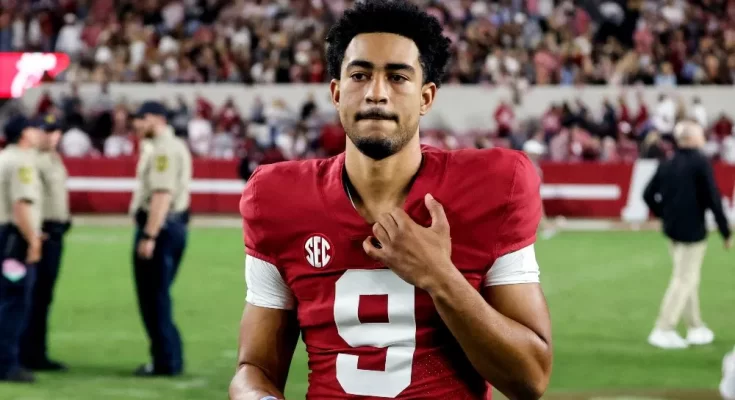Bryce Young’s Summer of Transformation: How Returning to School Elevated His Game and Mindset
In a league where every fraction of improvement can be the difference between mediocrity and stardom, Bryce Young, the young and promising quarterback of the Carolina Panthers, took an unconventional route this summer. While many players used the offseason to rest, train in isolation, or enjoy the spoils of their success, Young returned to school—not to chase academic credits or degrees, but to gain an entirely different kind of education. For Young, the classroom this summer was filled with lessons in leadership, preparation, and personal growth. He emerged from the experience with a wealth of knowledge that could change the course of his career, his team’s fortunes, and perhaps even the perception of what it means to be a quarterback in the modern NFL.
Bryce Young has always been known for his cerebral approach to the game. At Alabama, he distinguished himself not only with his arm talent and composure but also with a mental sharpness that separated him from his peers. He was not just a quarterback—he was a student of the game, an analyzer, and a thinker who approached every snap with calculated precision. Yet, after a challenging start to his NFL career, Young realized that talent alone would not carry him to the heights he aspired to reach. The speed and complexity of the professional game demanded more, and he knew he needed to evolve both mentally and physically.
This summer, Young went back to his roots, immersing himself in a learning environment that combined elements of football study with broader lessons in leadership and discipline. He attended specialized quarterback camps, worked closely with veteran coaches and analysts, and even sat in on sessions that focused on breaking down defensive schemes in ways he had never done before. The experience was less about mechanics and more about mastering the mental side of football—something that often separates good quarterbacks from the great ones.
For Young, the return to a “school” setting was both humbling and empowering. He approached the summer not as an NFL quarterback with a hefty contract but as a student eager to learn from anyone who could offer insight. He took notes, asked questions, and challenged himself to absorb every bit of information. From learning the finer points of footwork under pressure to understanding how to anticipate disguised coverages, Young left no stone unturned. He studied film not only of his own play but also of legendary quarterbacks like Drew Brees, Peyton Manning, and Tom Brady, analyzing how they adjusted mid-game and how they communicated with their teammates to gain an edge.
The results of his summer efforts were immediate and noticeable. Teammates and coaches alike have spoken about the difference in Young’s presence on the field. He’s sharper, more confident, and quicker in his decision-making. His ability to read defenses has improved significantly, allowing him to anticipate where the pressure is coming from and adjust his protections or progressions accordingly. These are the subtle but critical skills that often determine success in the NFL, where the margin between a completed pass and a turnover can be razor thin.
But Young’s return to school wasn’t just about football. He also took the time to learn about leadership, communication, and personal development. Working with mentors outside the game, Young delved into the psychology of leadership—how to inspire teammates, how to build trust, and how to remain composed under pressure. These lessons have already begun to pay dividends in the Panthers’ locker room, where Young has taken on a more vocal role. As one of the youngest quarterbacks in the league, it was crucial for him to find his voice and command respect not just through his play but through his ability to rally those around him.
Young’s journey is a reminder that growth in the NFL often happens off the field as much as on it. His willingness to step away from the traditional offseason routine and invest in his personal and professional development speaks volumes about his character and determination. It also highlights a shift in how modern quarterbacks approach the game. No longer is it enough to rely solely on physical skills; today’s quarterbacks must also master the mental and emotional aspects of leadership, preparation, and adaptability. Young’s summer of learning reflects that evolution.
The Panthers, for their part, are banking on Young’s growth to help turn the franchise around. After a tough 2024 season filled with ups and downs, the team is looking to their young quarterback as the centerpiece of their future. General manager Dan Morgan and new head coach Dave Canales have both praised Young for his dedication and work ethic, noting that his offseason approach sets the tone for the entire roster. With a stronger supporting cast and a system tailored to his strengths, the hope is that Young’s new wealth of knowledge will translate into on-field success.
What makes Young’s story particularly compelling is how relatable it is. In a league often dominated by narratives of natural-born talent and instant success, Young’s decision to go back and “hit the books,” so to speak, is a reminder that greatness is often earned through humility and hard work. He didn’t shy away from acknowledging where he needed to improve; instead, he embraced the challenge, seeking out resources that would push him to grow. It’s a mindset that separates those who plateau from those who ascend to elite status.
As training camp approached, reports out of Carolina indicated that Young looked more polished and in control than ever before. His throws were crisper, his timing sharper, and his command of the offense evident. Teammates described him as a “different player,” not in terms of raw talent but in terms of confidence and composure. Wide receivers noted that his ball placement had improved dramatically, while offensive linemen praised his ability to identify blitzes and adjust protections at the line of scrimmage. These are all signs of a quarterback who has matured—not just physically, but mentally.
Young’s return to school also had an impact on his personal life. Those close to him say he came back from the summer with a renewed sense of focus and balance. He’s more disciplined in his daily routine, from nutrition and training to mental preparation and recovery. This holistic approach is something that many of the game’s greatest players have embraced, recognizing that success in the NFL is as much about how you prepare Monday through Saturday as it is about how you perform on Sunday.
Looking ahead, the 2025 season could be a defining one for Young. The Panthers are entering a critical phase in their rebuild, and much of their success will hinge on his ability to take the next step as a franchise quarterback. His summer of learning has laid the foundation for that leap, but the real test will come when the games count and the pressure mounts. If Young can translate his newfound knowledge into consistent, high-level performance, he could not only elevate the Panthers but also establish himself as one of the league’s rising stars.
Of course, success in the NFL is never guaranteed. Young will face his share of challenges, from opposing defenses that study his every move to the inevitable ups and downs of a long season. But what sets him apart is his willingness to prepare relentlessly and adapt. That mindset, cultivated during his summer return to school, may prove to be his greatest weapon.
For fans in Carolina, there’s a sense of optimism building around Young. They see not just a talented quarterback, but a young leader who is willing to do whatever it takes to improve. His story is inspiring because it’s about more than just football—it’s about the pursuit of excellence, the humility to learn, and the drive to become the best version of oneself.
As the 2025 season unfolds, every snap Young takes will be scrutinized, every decision analyzed. But behind each throw and each play call will be the lessons he learned during those quiet summer months, when he chose to invest in his growth rather than rest on his early accomplishments. That decision could be the one that defines his career and sets the Panthers on a path back to relevance.
In many ways, Bryce Young’s summer of education is a blueprint for success in any field: never stop learning, never stop striving to improve, and never let setbacks define you. For the Panthers, it may mark the beginning of a new era—one led by a quarterback who is not just talented, but also wise beyond his years. And for Young, the summer of 2025 will likely be remembered as the turning point when he transformed from a promising young player into a true leader and difference-maker in the NFL.



